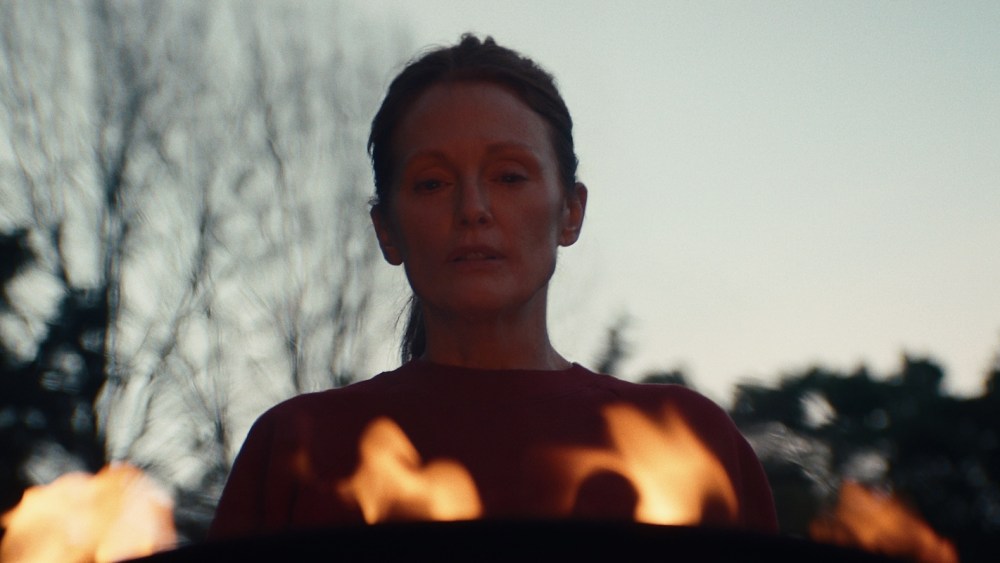Testing Limits of a Mother’s Unconditional Love
For anyone craving some classic Julianne Moore energy, director Michael Pearce’s “Echo Valley” feels like a throwback to the fierce copper-coifed star’s early career. Before “Short Cuts” and “Boogie Nights” and a well-deserved Oscar win, Moore played the duly suspicious snoop in “The Hand That Rocks the Cradle.” That early-’90s thriller may have been a potboiler, but Moore stole the show, sinking her teeth into every overripe line of dialogue (e.g. “A woman can feel like a failure if she doesn’t bring in 50 grand a year and still make time for blowjobs and homemade lasagna”).
In the well-cast if frequenlly illogical offering from Apple TV+, Moore slyly elevates what could have been a routine protective-mama drama. As Kate Garretson, a rural Pennsylvania farm owner who’ll stop at nothing to safeguard her heroin-addicted daughter Claire (Sydney Sweeney), Moore is as committed a parent as they come — which means there’s zero hesitation to do what’s “necessary” when Claire shows up with a corpse in the back seat of her car. Adding still another layer to Moore’s performance, the newly widowed Kate has been dealing with grief when presented with the threat of losing her only child.
Written by “Mare of Easttown” creator Brad Ingelsby, the movie poses a series of compellingly relatable moral questions, starting with: What would you do if your adult daughter were trapped in a whirlpool of self-destructive behavior? Kate has already dedicated every dollar she has to paying for Claire’s recovery. In a one-scene cameo, Kyle MacLachlan represents the tough-love alternative as Kate’s exasperated ex-husband, who’s ready to throw in the towel, but agrees to write one last check — well aware his daughter will find some way to waste it.
When Claire first shows up, Sweeney’s haggard appearance is doubly shocking for anyone who’s seen how radiant the star looks in most roles. Here, her frazzled hair is tinted a rebellious pink, and instead of covering up pimples and other imperfections, the makeup department has accentuated the red spots on her face and arms. Claire’s arrival is announced by the family dog, Cooper, who reliably barks every time she returns — more of a warning than a welcome sign, considering whatever drama Claire is inevitably dragging home with her.
This time, the prodigal daughter shows up babbling about the latest fight with her bad-news boyfriend, Ryan (as this strung-out scarecrow of a man, Edmund Donovan is the picture of every mom’s worst nightmare). The harder Kate insists that her daughter leave him, the more her daughter seems inclined to go back. Moore perfectly captures the impossible situation Claire puts a mother in: Her instinct is to shield her daughter from harm, but in fact, Claire is a danger in and of herself.
The film’s most frightening scene is a fight between Claire and her mom, when the manipulative young woman tries every tactic imaginable to extort money from Kate, from tearing out her hair to kidnapping Cooper. Make that the second scariest, as Claire’s antics bring another menacing character into their lives, when her dealer, Jackie (Domhnall Gleeson), shows up at Echo Valley looking for 10 grand in heroin. “Your junkie daughter has two choices,” he sneers: recover the missing dope or repay him.
These aren’t the kinds of problems a self-reliant horse-riding instructor typically has to concern herself with. So you can’t blame Kate for feeling slightly relieved when Claire shows up covered in blood — not her own, but Ryan’s, the sobbing girl insists — since the prospect of Claire having accidentally killed her abusive enabler is infinitely better than the reverse scenario.
A real actor’s director, Pearce seems to be drawn to situations that push ordinary characters to extremes (which was every bit as true of previous features “Beast” and “Encounter” as it is “Echo Valley”). Here, Kate sends her daughter up to her room and shifts into damage-control mode, driving the corpse out to a nearby lake and trusting a couple of cinderblocks to drag it to the (startlingly shallow) bottom. Ingelsby’s script has plenty of twists up its sleeve, but the best occurs in the second shot of the movie, when a detail strategically omitted from the movie’s marketing campaign is revealed.
Kate’s partner — the one who died a few months before the movie begins — was a woman. Though it’s a nonissue to everyone in the story, the lesbian angle story gives “Echo Valley” a shot of originality it otherwise lacks, plus a circle of emotional support from a group of female friends led by Fiona Shaw. Tonally, the movie feels akin to all those so-called “psychological thrillers” from the 1990s (a respectable label for glorified woman-in-peril movies), but the film it most closely resembles came a few years later: “The Deep End,” starring Tilda Swinton. Both give their stars some actual psychology to explore, playing mothers who pay to protect their kids — even if “Echo Valley” stops making logical sense when Gleeson’s character returns looking to extort more money from Kate.
When you’re simply looking for something semi-interesting to stream, stories like these don’t necessarily require great actors, but great actors are the reason some of them still reverberate in our memory decades later.


